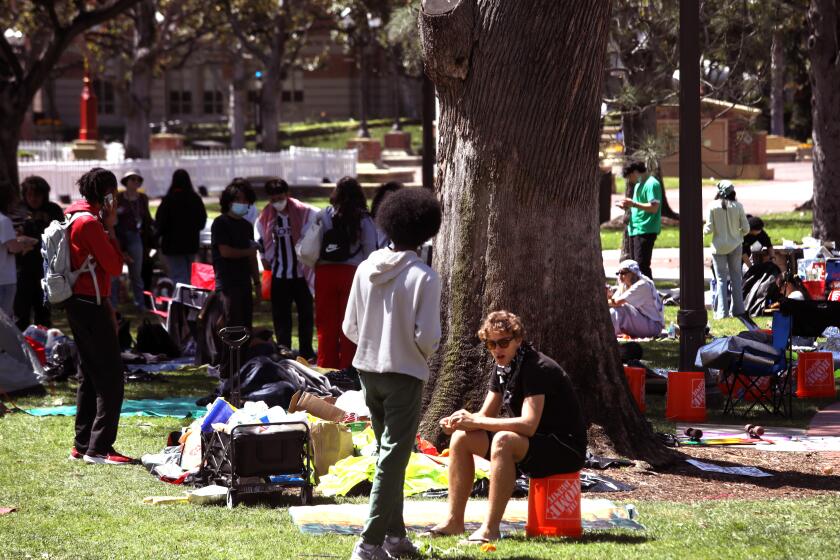Palin speech at Cal State campus draws attention to foundations linked to universities
An invitation to former Alaska Gov. Sarah Palin to speak at Cal State Stanislaus’ 50th anniversary gala is generating controversy and raising questions about the foundation that is paying her. The nonprofit is refusing to divulge her speaking fees.
The foundation’s secrecy has raised scrutiny over the financial dealings and clout of that group and scores of others like it that are associated with California’s public universities. The foundations raise billions of dollars for scholarships and other programs, run student organizations and bookstores and perform other crucial campus functions. But they are set up as private entities and are not subject to state law that requires public agencies, including schools, to disclose information about how money is raised and spent.
Among recent incidents drawing attention: A Sonoma State foundation made a $1.25-million loan to one of its former board members, who then defaulted on the loan. A nonprofit at Cal State Sacramento is being audited by the attorney general for loans made to the university president. Foundations at San Francisco City College, Cal State Fresno and the San Jose/Evergreen Community College District have also been embroiled in controversy over financial decisions, according to state Sen. Leland Yee (D-San Francisco), who is looking into the activities.
Concern about the foundations comes amid broader questions about how public universities spend taxpayers’ dollars. This includes recent disclosures about the use of funds meant for classrooms and students to cover real estate and construction costs and other business pursuits.
The California Faculty Assn. and the California Newspaper Publishers Assn., among others, are pressing for more transparency from the foundations and other auxiliary groups. They are supporting legislation, SB 330 by Yee, that would require these groups to adhere to California’s Public Records Act. Last year, a similar bill, SB 218 by Yee, was vetoed by Gov. Arnold Schwarzenegger, who said some of its provisions would have a “chilling effect” on the support of donors and volunteers if their names were disclosed.
The new bill would protect the privacy of donors except in cases in which contributors are given a gift of $500 or more. It has passed the Senate and awaits an Assembly hearing.
Yee has asked Atty. Gen. Jerry Brown to investigate Cal State Stanislaus for failing to provide documents relating to Palin’s fundraising appearance. Yee said the Stanislaus Foundation is housed on the campus, staffed by university employees, uses university e-mail accounts, telephones, computers and other resources and is headed by university President Hamid Shirvani.
“The Stanislaus situation provides the clearest evidence of the collusion between the foundation and the state university, the clearest evidence of the relationship between the two and that they are, in fact, not independent of each other,” Yee said. “The larger issue is that I believe the state universities have been shifting some of their state responsibilities over to the foundations for the sole purpose of hiding transactions involving millions of dollars from the public.”
Meanwhile, Cal State Stanislaus students will join Yee in a news conference Tuesday to disclose documents they say relate to the university’s contract with Palin. The students and Yee say they will hand over the documents to the attorney general for further investigation.
Universities and colleges argue that much financial information is already available to the public in annual tax filings and audits that are frequently posted on campus websites. But critics contend financial decisions -- such as investments and loans -- are made out of sight and hold the potential for misuse. For example, without a full accounting of the Palin fee, they argue, it would be hard to ascertain whether the event raises money for the foundation.
In the 23-campus Cal State system, more than 90 foundations and auxiliaries control $1.34 billion, about 20% of the universities’ $6.7 billion budget, according the chancellor’s office. In the 10-campus University of California system, 10 major campus foundations hold about $4 billion in assets.
State law allows foundations and other nonprofits to provide some essential services that contribute to the educational mission of the university.
At Cal State, for instance, campus radio stations, recreational sports activities and food services typically are funded and operated by auxiliary groups rather than the university. The organizations are self supporting and use no general fund monies.
But the vast sums from grants and contributions coupled with scant public oversight should invite concern, particularly when state funding cutbacks have led many campuses to trim programs, reduce student enrollment and furlough staff, said Terry Francke, the general counsel of Californians Aware, a nonprofit group that promotes open government.
“There is the question of whether these institutions are being managed well,” said Francke, whose group has also requested documents about the Palin appearance. “These are nonprofit, charitable enterprises but they are also business enterprises. That’s all the more significant in an environment of severely rationed resources.”
Shirvani, at Cal State Stanislaus, declined to discuss the issues surrounding Palin’s June 25 appearance, a $500-a plate, black-tie affair. In a statement, Matt Swanson, president of the foundation, cited government code that exempts auxiliary organizations from the Public Records Act. He said that the Washington Speakers Bureau, which represents Palin, requires that financial terms of speaker appearances remain confidential. The Speakers Bureau did not return calls for comment.
“I can assure you that no public funds are being used to support this event,” Swanson said. “All funds used have been given for the express purpose of putting on this event in order to raise money to benefit university programs and student services.”
But although Cal State and UC maintain that foundations and other nonprofits should continue to play a vital role, they also have become aware of the need for more transparency. The universities have proposed an amendment to Yee’s legislation that would maintain the separate status of foundations and auxiliaries but make available to the public more documents, including audited financial statements, compensation plans, records documenting loans and investment practices and names of donors who have made significant contributions in exchange for substantial gifts.
They argue that Yee’s bill would make it more difficult to raise funds and that it would be costly to handle public records requests.
“We believe in allowing for transparency as much as possible and think there’s a way to do that without undue costs,” said Erik Fallis, a Cal State University spokesman.
But Yee’s staff said the senator believes the proposed amendment would weaken the Public Records Act and that he has no intention of including it.
More to Read
Start your day right
Sign up for Essential California for news, features and recommendations from the L.A. Times and beyond in your inbox six days a week.
You may occasionally receive promotional content from the Los Angeles Times.







